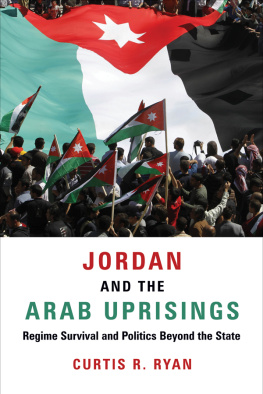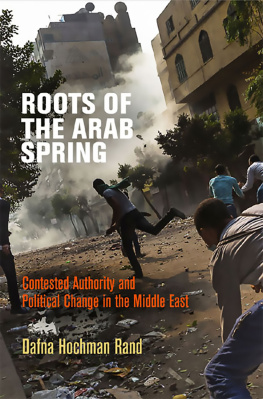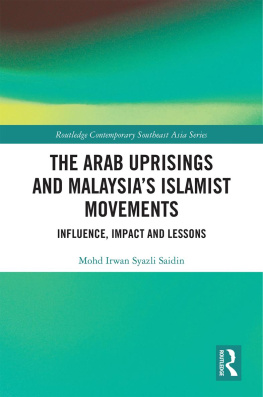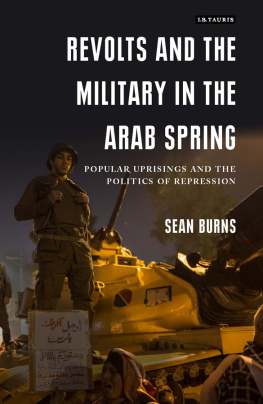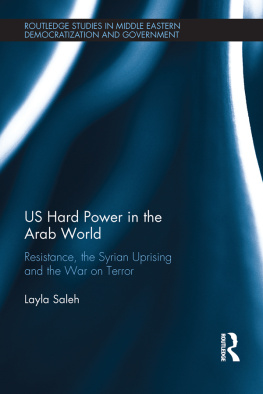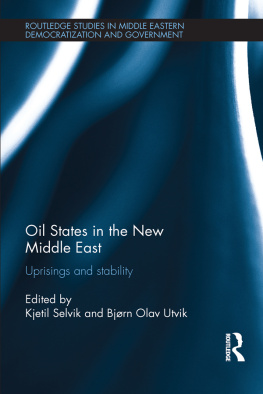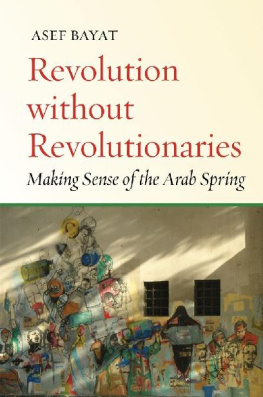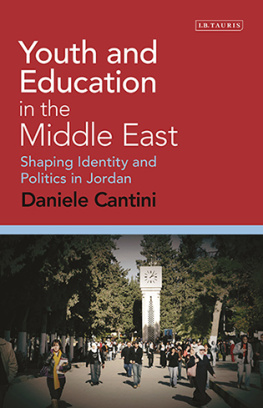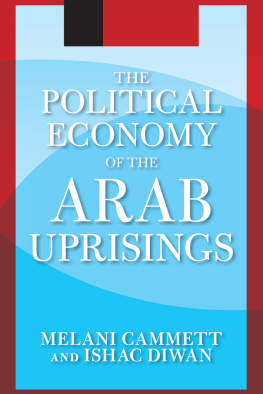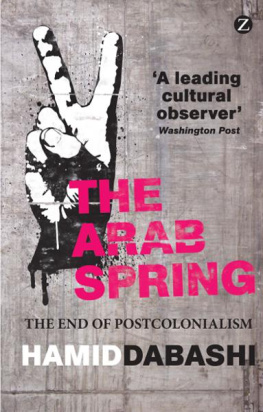COLUMBIA STUDIES IN MIDDLE EAST POLITICS
Marc Lynch, Series Editor
Columbia Studies in Middle East Politics presents academically rigorous, well-written, relevant, and accessible books on the rapidly transforming politics of the Middle East for an interested academic and policy audience.
The Arab Uprisings Explained: New Contentious Politics in the Middle East , edited by Marc Lynch
Sectarian Politics in the Gulf: From the Iraq War to the Arab Uprisings , Frederic M. Wehrey
From Resilience to Revolution: How Foreign Interventions Destabilize the Middle East , Sean L. Yom
Protection Amid Chaos: The Creation of Property Rights in Palestinian Refugee Camps , Nadya Hajj
Religious Statecraft: The Politics of Islam in Iran , Mohammad Ayatollahi Tabaar
Local Politics in Jordan and Morocco: Strategies of Centralization and Decentralization , Janine A. Clark
Columbia University Press
Publishers Since 1893
New YorkChichester, West Sussex
cup.columbia.edu
Copyright 2018 Columbia University Press
All rights reserved
E-ISBN 978-0-231-54656-0
Library of Congress Cataloging-in-Publication Data
Names: Ryan, Curtis R., author.
Title: Jordan and the Arab uprisings : regime survival and politics beyond the state / Curtis Ryan.
Other titles: Columbia studies in Middle East politics.
Description: New York : Columbia University Press, 2018. | Series: Columbia studies in Middle East politics | Includes bibliographical references and index.
Identifiers: LCCN 2017049197| ISBN 9780231186261 (cloth : alk. paper) | ISBN 9780231186278 (pbk. : alk. paper)
Subjects: LCSH: JordanPolitics and government1999 | Arab Spring, 2010
Classification: LCC JQ1833.A58 R93 2018 | DDC 956.9504/5dc23
LC record available at https://lccn.loc.gov/2017049197
A Columbia University Press E-book.
CUP would be pleased to hear about your reading experience with this e-book at .
Cover image: GettyImages Khalil Maraawi
T his book explains how Jordan weathered the Arab uprisings, but it also provides an analytical understanding of Jordanian politics that is meant to last far beyond the era of the Arab Spring and the regional instability that followed. Each chapter tackles a different dynamic in the kingdoms politics, tracking each theme before, during, and after the regional Arab Spring but also indicating how it is key to understanding Jordanian politics overall.
While domestic political dynamics are the main focus, the framework also emphasizes that Jordans domestic politics takes place within a broader regional setting. Regional context and external constraints deeply affect internal politics for both regime and opposition in Jordan. My analysis therefore takes the international setting seriously and shows its impact on domestic politics in the kingdom. As a small state, weaker than its neighbors by almost every conceivable measure, Jordan remains militarily, economically, and politically vulnerable. While this is a constant feature of Jordanian politics, it is also a change in terms of the scale of externally generated challenges (such as the massive influx of Syrian refugees) and explicit security threats (from regional wars to the rise of ISIS) in the era of the Arab uprisings. Domestic-international linkages affect Jordanian domestic politics to such an extent that it would be impossible to understand Jordans internal politics without also examining its regional setting.
The research for the book included considerable field work and interviews with countless Jordanians, in places that ranged from street protests to palaces. My analysis of Jordanian politics draws on almost thirty years of study of the country, including my first arrival in Jordan in the summer of 1989. But most of the interviews, meetings, and discussions for this project came from repeated trips to the kingdom during and after the Arab Spring periodspecifically, in ten research visits between December 2010 and August 2016. In every research visit to Jordan, my emphasis has been to talk to as many people as possible, from different walks of life, ideological perspectives, and levels of economic or political power. While the interpretations and analyses in this book are entirely my own, I draw on insights from leftists, liberals, conservatives, Islamists, pan-Arab nationalists, royalists, revolutionaries, reformers, and even Jordanians who see themselves as nonpolitical.
I have met at length with activists, opposition party officials, former prime ministers, government officials, cabinet ministers, members of parliament, journalists, business people, and even King Abdullah II and Queen Rania. I have tried through multiple visits to the country to get to know Jordan from left to right, secular to religious, andin terms of powertop to bottom. Throughout the book I have tried to include, via direct quotes, as many and as diverse a selection of Jordanian voices as I can, to give a comprehensive picture of the countrys politics. I therefore owe thanks to manyseemingly countlessJordanians. While I cannot thank everyone, I will single out those who were especially generous with their time and their thoughts on various aspects of Jordanian politics. I will also include many with whom I met but discussed matters other than politics.
First, thanks go to King Abdullah II and Queen Rania for agreeing to meet and for being very gracious with their time. I met several times with King Abdullah and once with Queen Rania. While my meetings with the king always focused on various topics in Jordanian politics and policy, my meeting with Queen Rania was not about Jordanian politics at all but instead about her educational outreach efforts. Similarly, when I met with Prince Talal bin Muhammad, we spoke mainly of Jordanian history and society. In my meeting with Prince Ali bin al-Hussein, we did not discuss Jordanian politics but instead focused entirely on efforts of the Asian Football Development Project (AFDP) to bring soccer to children in Syrian refugee camps and Jordanian host communities. I thank Prince Talal and Prince Ali for their insights and time. And I thank Merissa Khurma for making my meeting with Prince Ali possible, for helping me visit Zaatari refugee camp, and for her friendship. Regarding research on the refugee issue in Jordan, I thank UNHCR and especially Andrew Harper for his many insights.
The palace meetings with King Abdullah and Queen Rania would not have been possible without the efforts and support of many people at the Royal Hashemite Court (RHC). Some have since shifted to other jobs and positions but at the time worked for the RHC. I especially thank Imad Fakhoury, Khalid Dalal, Sharif Abdullah, Muin Khoury, Fares Braizat, Francesca Sawalha, Christina Hawatmeh, and Rusul Arabiyyat.
In the course of many trips to Jordan, I have met with many current and former government officials. But I want to acknowledge several who have been particularly generous with their time and thoughts: former senators and prime ministers Awn Khasawneh, Taher al-Masri, and Fayez Tarawneh, and former cabinet ministers Kamel Abu Jaber, Abd al-Ilah al-Khatib, Omar al-Razzaz, Ayman Safadi, Ibrahim Saif, and Malek Twal.

